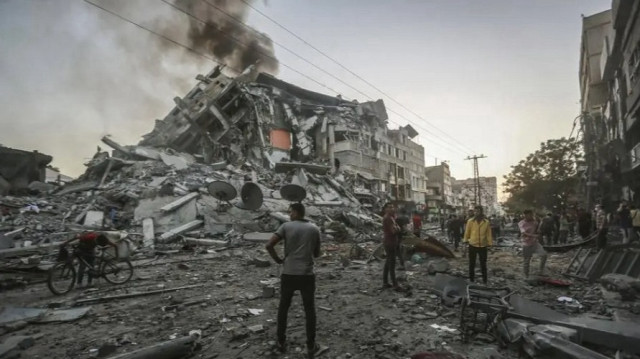
Several Israeli soldiers have been killed by Palestinian groups in Gaza over the past few weeks, which experts say shows their tactical evolution and growing strain on the Israeli military
- Hamas and its allies have adapted their strategies under new generation of leaders, say analysts
- Experts say mounting attacks are also a tactic to pressure Israel into ceasefire concessions, but could backfire by fueling mistrust and hardening attitudes
Since late June, Palestinian groups in Gaza have sharply intensified their attacks on Israeli forces operating inside the enclave, highlighting both their tactical evolution and growing strain on the Israeli military.
At least 21 Israeli soldiers have been killed in just over three weeks, according to an Anadolu tally, underscoring the deepening challenges for Israel's ground forces and complicating ongoing ceasefire negotiations.
Other reports indicate a growing psychological toll on Israeli troops, with at least three soldiers reportedly dying by suicide within the last 10 days.
Israeli newspaper Maariv recently described the army as “mired in the quagmire of Gaza,” reflecting growing unease within the military's leadership about the viability of a prolonged campaign.
One notable setback, according to the paper, came when a state-of-the-art Israeli tank was severely damaged during operations in Jabalia, further fueling doubts over the cost and sustainability of Israel's presence in the Palestinian territory.
Israel Ziv, a retired major general and former head of the Israeli army's Operations Directorate, attributed the escalation to Hamas' tactical shift toward decentralized guerrilla warfare.
Instead of defending territory, he explained, the group and its allies now operate in loosely organized, mobile cells, using Gaza's tunnel networks to launch surprise attacks.
“Their war is built around our weaknesses. They don't defend territory – they seek targets,” Ziv told CNN.
He said many of the explosives used in recent attacks were crafted from unexploded Israeli munitions, repurposed into improvised devices deployed in ambushes.
- Combat experience and new leadership
Sadeq Abu Amer, director of the Palestine Dialogue Group, said the sharp rise in attacks reflects the growing tactical experience of Palestinian resistance groups after nearly two years of constant conflict.
Israel's continued deployment in Gaza, he added, has contributed to both military fatigue and operational exposure.
“Many Israeli soldiers are exhausted due to prolonged deployments on the Gaza front for nearly two years, which even a highly capable army like Israel's cannot fully overcome,” Abu Amer told Anadolu.
He also noted that a younger breed of Palestinian commanders largely unknown to Israeli intelligence – “a third or fourth generation of commanders” – has introduced new battlefield techniques.
Abu Amer highlighted the increasing vulnerabilities of Israeli troops, particularly in Khan Younis and other southern areas, where urban density and territorial sprawl make them more susceptible to ambushes.
The reuse of Israeli weapons is also a symbol of strategic adaptation, he added.
- Political fallout and public opinion in Israel
Ahmad al-Hila, a Palestinian political analyst, linked the timing of the escalation to broader regional dynamics, especially Israel's recent campaign against Iran.
“Since the end of Israel's war on Iran, Palestinian factions and the al-Qassam Brigades have notably escalated their operations,” he said.
Al-Hila argued that the attacks demonstrate the failure of Israeli strategies aimed at crushing Palestinian resistance or forcibly displacing populations.
Within Israel, the political consequences are becoming increasingly apparent.
A Channel 12 poll revealed that 74% of Israelis now support ending the war in Gaza in exchange for the release of hostages, a major shift in public sentiment that puts Prime Minister Benjamin Netanyahu under more pressure.
Al-Hila explained that Netanyahu faces a dilemma: he is trying to preserve his ruling coalition with a temporary ceasefire while keeping the option of renewed war on the table.
“But at the same time, he realizes that returning to war after 60 days of calm has become difficult, as it does not guarantee victory after nearly 21 months of ongoing fighting and attrition,” he said.
With parliamentary elections looming in 2026, any renewed military offensive risks undercutting Netanyahu's popularity, particularly following the recent war with Iran, which had briefly boosted his domestic support, he added.
- Tactical pressure for truce talks
Andreas Krieg, associate professor at King's College London's School of Security, said the escalating attacks on Israeli forces indicate that Hamas remains operationally capable and strategically flexible, despite losing several top commanders.
He said the group's latest attacks serve multiple objectives: retaliating against Israeli operations in Rafah and Khan Younis, protesting what it views as violations of previous ceasefire terms, and demonstrating the continuity of leadership despite Israeli targeted killings.
Krieg also sees it as a deliberate tactic to pressure Israel into meaningful concessions in ceasefire negotiations, but warned it could backfire by fueling Israeli mistrust and hardening attitudes.
“Israel remains focused on maintaining freedom of military action and dismantling Hamas's fighting capabilities; it sees any long-term ceasefire without these guarantees as risky,” Krieg said.
Still, he acknowledged that the attacks “might push Israel to accept short-term pauses to reduce immediate pressures, only to resume operations later – perpetuating the cycle without securing a durable end to the war.”







